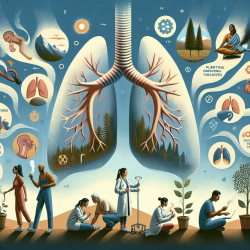Introduction
As a Special Education Director, I am constantly seeking innovative strategies to enhance the learning environment for students with special needs. One often overlooked factor is the impact of air pollution on respiratory health, which can significantly affect students' well-being and learning capabilities. The research article "Personal strategies to minimise effects of air pollution on respiratory health: advice for providers, patients and the public" provides valuable insights that can be utilized by practitioners to improve their skills and advocate for healthier environments.
Understanding the Impact of Air Pollution
Air pollution is a global concern, with the World Health Organization recognizing it as a top environmental threat to human health. The research highlights that air pollution contributes to approximately 9 million deaths annually, with a significant portion affecting respiratory health. This is particularly concerning for students with pre-existing respiratory conditions such as asthma or COPD.
Implementing Personal Strategies
The research outlines several personal strategies that can be implemented to reduce exposure to air pollution and improve respiratory health. As practitioners, we can incorporate these strategies into our practice and encourage students, parents, and staff to adopt them:
- Limit Outdoor Activities: Encourage students to reduce physical exertion outdoors on high pollution days. Utilize air quality alert systems to plan activities accordingly.
- Use of Facemasks: Advocate for the use of N95 facemasks in high pollution areas, especially for students with respiratory conditions. Ensure proper usage and fit.
- Optimize Indoor Air Quality: Promote the use of portable air cleaners with HEPA filters in classrooms and therapy rooms to reduce indoor air pollution.
- Advocate for Clean Fuels: Educate families on the benefits of using clean fuels and improving household ventilation to minimize indoor air pollution.
Encouraging Further Research
While the current research provides a strong foundation, there is a need for further studies to validate and enhance these strategies. Practitioners can play a crucial role in advocating for research that focuses on the specific needs of students with disabilities and the impact of air pollution on their health and learning outcomes.
Conclusion
By implementing the personal strategies outlined in the research, practitioners can significantly improve the respiratory health of students and create a healthier learning environment. It is essential to stay informed and advocate for policies and practices that prioritize air quality and student well-being.
To read the original research paper, please follow this link: Personal strategies to minimise effects of air pollution on respiratory health: advice for providers, patients and the public.










